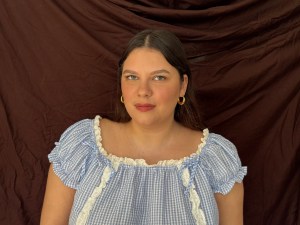First Nations writing is literally making waves
The First Nations Writers Festival to be held over two days in Townsville at the end of May is a welcome addition to the literary circuit.

One of the great joys of this year’s fourth annual First Nations Writers Festival is celebrating the alumni who have gone on to be published with great success since their talents were discovered at the event.
The festival, which will be held in Townsville, May 30-31, includes a moving debut from Mabel Gibson with Crybaby – a collection of short autobiographical stories that chronicle her artistic growth across the landscapes of Albany, Geraldton and Perth until she ultimately recognises her voice as a writer. Crybaby was published in February using a dreamy and fragmented structure heralded as innovative, wild and profoundly moving.

Gibson says her writing and perspective as a 25-year-old Yamatji woman would never have seen the light of day without the vital encouragement of the festival, which was founded by entrepreneur Anna Borzi to unearth First Nations talent who weren’t being heard or recognised.
“Crybaby is my memoir,” Gibson explains. “It’s little memories from ages four to 25 and just zooms in on moments in my life, some significant and some insignificant. A lot of it is about identity, especially the lack of identity I felt as a First Nations woman whose family was part of the Stolen Generation.
You might like
“We have a lot of lost history in my family, and even though so much of it feels lost, it still obviously exists within us. And so, I feel like Crybaby is an exploration of that sort of identity and what it means to be First Nations in the 21st century, which I think is quite different to other First Nations writing that has been done in the past.”
FNWF is a not-for-profit festival that showcases the unique and culturally rich stories of Australia and the Greater Pacific. It gives First Nations writers from Australia, New Zealand, PNG, Polynesia, Melanesia, Micronesia and the Pacific Islands the opportunity to have their work recognised and potentially published.
“I feel really thankful that they’ve been really, really supportive and set me up. It’s amazing,” Gibson says. “I really didn’t expect it when I was writing. It’s my first book, so I didn’t really know what to expect at all. I didn’t really think that I could make a career out of it. For lots of people, writing seems like a dream job. It doesn’t really seem like a real possibility, but I just kind of kept going with it. I wasn’t really sure who was going to read the book or what would come of it. But I’ve been really overwhelmed with the response from it so far.”
‘The Western world came along thousands of years after the knowledge was settled in the First Nations Peoples’
Subscribe for updates
Gibson’s story is one Borzi loves to celebrate as the reason she started the festival in the first place – to encourage more First Nations writing and get more manuscripts ready for publishing – in their voice.
“From my personal perspective, I can tell you, we now know for a fact that they are incredible scientists,” Borzi says. “They are incredible managers. They have incredible societal structures. They’re incredible at agriculture and fish farming and management.
“The Western world came along thousands of years after the knowledge was settled in the First Nations Peoples. Their storytelling structures are substantially different compared to Western-style stories. And bringing that different structural application to stories, it makes them far more in depth and engaging.”
This year’s event features the launch of eight new books and appearances from nine award-winning authors, as well as the FNWF Awards hosted by internationally recognised Disney choreographer Peter Rockford Espiritu, from Hawaii. The festival will be live streamed.
“Last year we had 260 people around the Pacific watch it for the whole five hours,” Borzi says. “So, we love to keep reminding everyone that they can watch this live anywhere. Stories are being appreciated and published and they hear the authors speak about their work.”
Mabel Gibson is thrilled to be able to give a bit back to the festival this year, travelling far from her WA home to take part, and hopes it continues to encourage Indigenous voices in print for many years to come. Since being published she’s appeared at the Perth Writers Festival, Ubud Writers Festival and Margaret River Readers and Writers Festival, and hopes to one day become a publisher to provide opportunities for other First Nations writers.
“When I first started writing, I was hesitant to try and get my work published because I felt like the publishing industry was after a certain thing from Indigenous writing,” Gibson explains. “And to me that just feels like another way for non-Indigenous people to kind of control the narrative of what it is to be First Nations in Australia.
“So, I really appreciate that The First Nations Writers Festival is fostering all different types of voices. It’s extremely important. What I’m writing about, whether it’s directly telling you that I’m a First Nations woman or not, it doesn’t really matter because it is the writing of a First Nations woman. I’m so thankful for Anna and the festival.”
Free to share
This article may be shared online or in print under a Creative Commons licence

